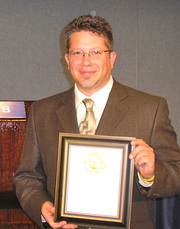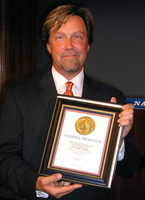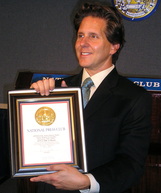2007 National Press Club Ann Cottrell Free Animal Reporting Award Winners
Print/Online:

Jesse Katz
Winner:
"What's a Dog Worth?" by Jesse Katz, Los Angeles Magazine
In 2005, in Los Angeles, 104,841 animals were put to death in the city's six municipal shelters. No other metropolitan area in the United States has killed more dogs and cats -- at least a million pets exterminated in the past decade -- more than 5 million during the past 35 years.
By following one dog - a weathered but friendly pit bull named Roy - through the machinery of the South LA shelter, Los Angeles magazine senior writer Jesse Katz , shows us that euthanasia is little more than a death of convenience, society's method for disposing of expendable pets. He reveals how the daily calculation to kill is made and who makes it. As the first LA journalist to gain access to the "bump room" since the 1970s, he is a witness the animals' last moments.
His story generated enormous response, and was designated "the talker story of the month" by one LA media outlet. Comments were robust, with one reader pointing out that the piece "wasn't just some story about stray dogs, it was a commentary on who we have become."
Honorable Mention:
"An Elephant Crackup" by Charles Siebert, New York Times Sunday Magazine
In his cover story, Siebert reveals the stunning result of the pervasive and harmful effects of human encroachment on elephants in the wild and of man's ongoing abuses of them in captivity. He illustrates the complexities and subtleties of elephant culture and consciousness, phenomena not typically accorded animals. He shows us that elephants are suffering a kind of post-traumatic stress disorder that has resulted in an unprecedented number of attacks on humans. His reporting reveals that elephants are losing their battle to survive -- and that we are witnessing a precipitous collapse of elephant culture brought on by decades of poaching and habitat loss.
Broadcast:

Jeff Burnside
Winner:
"Puppy Heartbreak", WTVJ/NBC 6, Miami, Florida
Jeff Burnside, Scott Zamost, Pedro Cancio, Robert Hernandez, Ed Garcia and Felix Castro
In a four month investigation, which resulted in a nine-part series , WTVJ TV took a close look at the practices of the self-proclaimed "world's largest celebrity pet store", based in South Florida. What it found was shocking.
The station talked to scores of customers whose dogs became very ill or died shortly after purchase. WTVJ conducted hundreds of interviews and reviewed more than a thousand public records related to complaints about the store. By gaining access to a pet store industry Internet auction site, the station was able to trace some of the dogs back to Midwest dog breeders known as “puppy mills”. The news team traveled to two of those breeders and captured inhumane and unhealthy conditions on tape – a side of the pet industry rarely seen by the public.
"Puppy Heartbreak", WTVJ/NBC 6, Miami, Florida
Jeff Burnside, Scott Zamost, Pedro Cancio, Robert Hernandez, Ed Garcia and Felix Castro
In a four month investigation, which resulted in a nine-part series , WTVJ TV took a close look at the practices of the self-proclaimed "world's largest celebrity pet store", based in South Florida. What it found was shocking.
The station talked to scores of customers whose dogs became very ill or died shortly after purchase. WTVJ conducted hundreds of interviews and reviewed more than a thousand public records related to complaints about the store. By gaining access to a pet store industry Internet auction site, the station was able to trace some of the dogs back to Midwest dog breeders known as “puppy mills”. The news team traveled to two of those breeders and captured inhumane and unhealthy conditions on tape – a side of the pet industry rarely seen by the public.
Honorable Mention
“From Stable to Table: America’s Dirty Little Secret”, KHOU-TV, Houston, Texas
When Brad Woodard’s series of reports aired on KHOU-TV in Houston, Texas, many viewers were shocked to learn that roughly 100,000 American horses were being slaughtered in the U.S. each year for human consumption abroad.
Texas is home to two of the nation’s three horse slaughtering facilities. Woodard’s reports exposed in graphic detail what goes on behind the walls of one of those facilities. Viewers were outraged and response poured in from all over the country. Many who had seen the story on television and the Internet contacted lawmakers in Washington.
In September, the American Slaughter Prevention Act was passed in the House but Congress adjourned before the Senate could consider the bill. The measure has been re-introduced in both chambers. In January, the U.S. Court of Appeals upheld a 1949 Texas state law barring the sale of horsemeat for human consumption. Appeals were rejected in March, effectively shutting down the horse slaughter industry in Texas.

